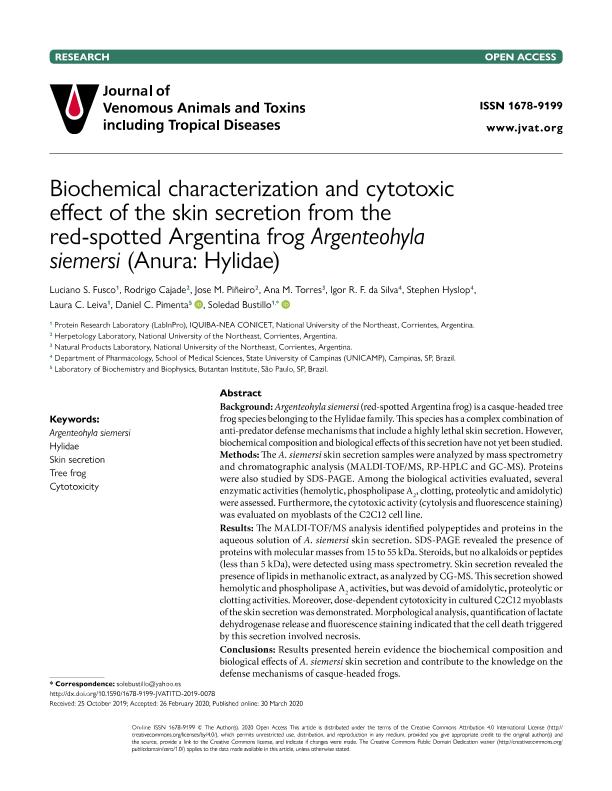Mostrar el registro sencillo del ítem
dc.contributor.author
Fusco, Luciano Sebastian

dc.contributor.author
Cajade, Rodrigo

dc.contributor.author
Piñeiro, Jose Miguel

dc.contributor.author
Torres, Ana M.
dc.contributor.author
da Silva, Igor R. F.
dc.contributor.author
Hyslop, Stephen

dc.contributor.author
Leiva, Laura Cristina Ana

dc.contributor.author
Pimenta, Daniel C.
dc.contributor.author
Bustillo, Soledad

dc.date.available
2020-09-03T15:55:01Z
dc.date.issued
2020-03
dc.identifier.citation
Fusco, Luciano Sebastian; Cajade, Rodrigo; Piñeiro, Jose Miguel; Torres, Ana M.; da Silva, Igor R. F.; et al.; Biochemical characterization and cytotoxic effect of the skin secretion from the red-spotted Argentina frog Argenteohyla siemersi (Anura: Hylidae); Cevap-unesp; Journal Of Venomous Animals And Toxins Including Tropical Diseases; 26; 3-2020; 1-13
dc.identifier.issn
1678-9199
dc.identifier.uri
http://hdl.handle.net/11336/113121
dc.description.abstract
Background: Argenteohyla siemersi (red-spotted Argentina frog) is a casque-headed tree frog species belonging to the Hylidae family. This species has a complex combination of anti-predator defense mechanisms that include a highly lethal skin secretion. However, biochemical composition and biological effects of this secretion have not yet been studied. Methods: The A. siemersi skin secretion samples were analyzed by mass spectrometry and chromatographic analysis (MALDI-TOF/MS, RP-HPLC and GC-MS). Proteins were also studied by SDS-PAGE. Among the biological activities evaluated, several enzymatic activities (hemolytic, phospholipase A2 , clotting, proteolytic and amidolytic) were assessed. Furthermore, the cytotoxic activity (cytolysis and fluorescence staining) was evaluated on myoblasts of the C2C12 cell line. Results: The MALDI-TOF/MS analysis identified polypeptides and proteins in the aqueous solution of A. siemersi skin secretion. SDS-PAGE revealed the presence of proteins with molecular masses from 15 to 55 kDa. Steroids, but no alkaloids or peptides (less than 5 kDa), were detected using mass spectrometry. Skin secretion revealed the presence of lipids in methanolic extract, as analyzed by CG-MS. This secretion showed hemolytic and phospholipase A2 activities, but was devoid of amidolytic, proteolytic or clotting activities. Moreover, dose-dependent cytotoxicity in cultured C2C12 myoblasts of the skin secretion was demonstrated. Morphological analysis, quantification of lactate dehydrogenase release and fluorescence staining indicated that the cell death triggered by this secretion involved necrosis. Conclusions: Results presented herein evidence the biochemical composition and biological effects of A. siemersi skin secretion and contribute to the knowledge on the defense mechanisms of casque-headed frogs.
dc.format
application/pdf
dc.language.iso
eng
dc.publisher
Cevap-unesp

dc.rights
info:eu-repo/semantics/openAccess
dc.rights.uri
https://creativecommons.org/licenses/by-nc-sa/2.5/ar/
dc.subject
ARGENTEOHYLA SIEMERSI
dc.subject
CYTOTOXICITY
dc.subject
HYLIDAE
dc.subject
SKIN SECRETION
dc.subject
TREE FROG
dc.subject.classification
Bioquímica y Biología Molecular

dc.subject.classification
Ciencias Biológicas

dc.subject.classification
CIENCIAS NATURALES Y EXACTAS

dc.title
Biochemical characterization and cytotoxic effect of the skin secretion from the red-spotted Argentina frog Argenteohyla siemersi (Anura: Hylidae)
dc.type
info:eu-repo/semantics/article
dc.type
info:ar-repo/semantics/artículo
dc.type
info:eu-repo/semantics/publishedVersion
dc.date.updated
2020-05-19T18:52:55Z
dc.journal.volume
26
dc.journal.pagination
1-13
dc.journal.pais
Brasil

dc.description.fil
Fil: Fusco, Luciano Sebastian. Consejo Nacional de Investigaciones Científicas y Técnicas. Centro Científico Tecnológico Conicet - Nordeste. Instituto de Química Básica y Aplicada del Nordeste Argentino. Universidad Nacional del Nordeste. Facultad de Ciencias Exactas Naturales y Agrimensura. Instituto de Química Básica y Aplicada del Nordeste Argentino; Argentina
dc.description.fil
Fil: Cajade, Rodrigo. Universidad Nacional del Nordeste. Facultad de Ciencias Exactas, Naturales y Agrimensura. Departamento de Biología. Laboratorio de Herpetología; Argentina. Consejo Nacional de Investigaciones Científicas y Técnicas; Argentina
dc.description.fil
Fil: Piñeiro, Jose Miguel. Universidad Nacional del Nordeste. Facultad de Ciencias Exactas, Naturales y Agrimensura. Departamento de Biología. Laboratorio de Herpetología; Argentina. Consejo Nacional de Investigaciones Científicas y Técnicas; Argentina
dc.description.fil
Fil: Torres, Ana M.. Universidad Nacional del Nordeste; Argentina
dc.description.fil
Fil: da Silva, Igor R. F.. Universidade Estadual de Campinas; Brasil
dc.description.fil
Fil: Hyslop, Stephen. Universidade Estadual de Campinas; Brasil
dc.description.fil
Fil: Leiva, Laura Cristina Ana. Consejo Nacional de Investigaciones Científicas y Técnicas. Centro Científico Tecnológico Conicet - Nordeste. Instituto de Química Básica y Aplicada del Nordeste Argentino. Universidad Nacional del Nordeste. Facultad de Ciencias Exactas Naturales y Agrimensura. Instituto de Química Básica y Aplicada del Nordeste Argentino; Argentina
dc.description.fil
Fil: Pimenta, Daniel C.. Governo do Estado de Sao Paulo. Secretaria da Saude. Instituto Butantan; Brasil
dc.description.fil
Fil: Bustillo, Soledad. Consejo Nacional de Investigaciones Científicas y Técnicas. Centro Científico Tecnológico Conicet - Nordeste. Instituto de Química Básica y Aplicada del Nordeste Argentino. Universidad Nacional del Nordeste. Facultad de Ciencias Exactas Naturales y Agrimensura. Instituto de Química Básica y Aplicada del Nordeste Argentino; Argentina
dc.journal.title
Journal Of Venomous Animals And Toxins Including Tropical Diseases

dc.relation.alternativeid
info:eu-repo/semantics/altIdentifier/doi/http://dx.doi.org/10.1590/1678-9199-JVATITD-2019-0078
dc.relation.alternativeid
info:eu-repo/semantics/altIdentifier/url/https://www.scielo.br/scielo.php?script=sci_arttext&pid=S1678-91992020000100306
Archivos asociados
